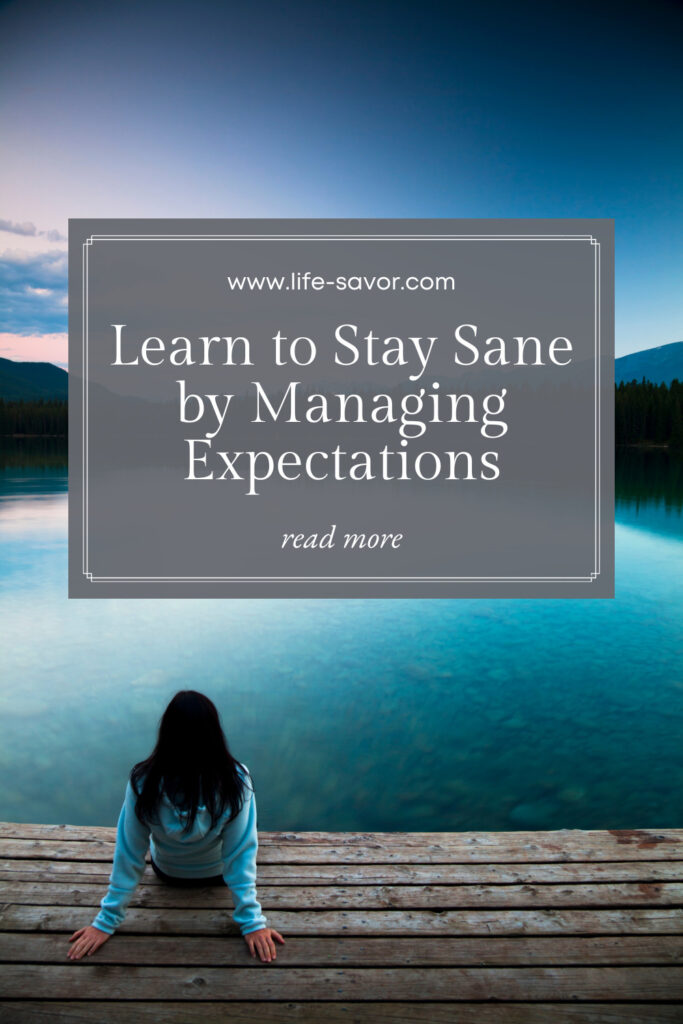When you release expectations, you are free to enjoy things
for what they are instead of what you think they should be.
(Mandy Hale)[1]
Expectation primes us to be disappointed if things don’t work out exactly as planned. In reality, life rarely goes exactly as planned (especially when others are involved), and progress is often necessarily slow and uncertain.
Furthermore, expectations make us pre-live what we think our experiences should be to the point of leaving us emotionally fatigued, bored and disappointed by the time the results of our goals become real. We can get so caught up in our expectations that we put all of our satisfaction in the future and make a barren experience of the moments we actually live.
Oft expectation fails
And most oft there
Where most it promises.
(Shakespeare)[2]
Evolution designed us to have expectations so that we can be effective, not so that we can feel satisfied. To be both effective and satisfied, we must learn to fluidly manage and occasionally downshift our expectations. We need to learn how to be emotionally okay with the results reality gives us for our efforts, and to be realistic about what’s worth getting upset about and what’s not.
This doesn’t mean we stop trying to do better, but rather that we’re less devastated by reality being reality. We keep seeking excellence, but we stop expecting reality to act like a loyal friend. Managing expectations isn’t about destroying hope or determination, but rather about using emotional intelligence to enhance our equanimity, even as we enthusiastically pursue our goals.

4 Ways to Manage Expectations

1. Fight “Hedonic Adaptation”
“Hedonic adaptation” is our evolutionary tendency to become complacent with the progress and values we do achieve. When we finally get the job (or car, or relationship, or anything) that we always dreamed of, do we stay happy? No. That new value becomes an old value that we soon take for granted. That’s hedonic adaptation.
Hedonic adaptation forces us onto a treadmill of dissatisfaction by constantly moving our carrot of satisfaction further away from us. It constantly moves our attention from what we have to what we don’t yet have. Our only satisfaction then comes from what we expect to happen in the future.
Hedonic adaptation has evolved because it’s good for our species’ survival. Evolution does its best to use us as stressed-out, achievement-driven self-propagation tools. This is good for our species’ survival because it motivates us to keep advancing, surviving and reproducing, but it can undermine our own individual sense of contentment and fulfillment while we’re living.
We shouldn’t let our brain push us around this way. As volitional creatures, we can use psychological “tricks” or tools on ourselves to short-circuit evolution’s mandate and shift to a healthier, more fulfilling perspective.
2. Think About Death (Mortality Awareness)
If one considered life as a simple loan,
one would perhaps be less exacting.
(Eugene Delacroix)[3]
Thinking about death helps us counter hedonic adaptation. What if today were your last day alive? What would you worry about? What would you do? What would you appreciate? What would be important?
We all fall prey to expectations, but pondering death helps us see each day as a gravy-filled value when compared with the alternative. Mortality awareness helps us appreciate and exploit the time and values we still have, providing a reset button for our expectations by helping us remeasure what’s really important in and about our remaining time alive.
3. Experience Gratitude (Especially for Life)
Gratitude grounds our expectations by reversing our sense of entitlement. When truly grateful, we take nothing, not even our life, for granted. Gratitude helps us appreciate again the million little things that are even slightly better than not existing at all. A piece of music, a breeze on our face, a quiet moment alone, the attention of a friendly dog.
Deep gratitude helps us see today as a miracle, simply because we’re alive—simply because blood is pumping through our veins and breath is filling our lungs.
| 4 Ways To Increase Gratitude |
|---|
1. Make a gratitude list Write down five things you’re grateful for today. After several days, your brain will start noticing the good things in your life. 2. Imagine Deep Loss Imagine losing a deep value. Your life. Or maybe your legs. Or your soulmate. Or the life of your child. Now go for a walk with those legs; embrace your soulmate; embrace your child. Imagining deep loss helps wake us to the gifts we already have. 3. Deny Yourself Values (for a while) Fast for a day—from food, progress and rewards. Spend time away from your partner and kids. Time away from values helps us to value them more deeply 4. Read Life Savor: Treasuring Our Gift of Life Learn to be grateful for the most basic value you have: your life itself. On an existential level, learn to see why you are profoundly lucky just to be alive as a human being. Click here to learn more about the book. |
4. Experience This Moment Now
Although I don’t believe “living in the now” should be our only goal in life, it’s a great tool for reframing our expectations, feeling calmer, and becoming aware of the values all around us.
Here are a couple of good ways of entering “the now”:
Meditation
Meditation proves to our mind that we’re okay right now, and that we can be okay without constant stimuli and the carrot of expected rewards. Disengaging us from reward-based feedback loops and attachment to outcomes, meditation injects a bit of equanimity into our lives.
Meditation involves repetitive focus on a single mundane thing (a word, our breath, or perhaps a point on the wall), making the anxious frontal part of our brain so bored that it shuts down enough to let us experience simply existing for a while. Meditation helps our brain focus on awareness itself so we’re not always just chasing (and anxious about) the rewards of awareness.
Soul Therapy
Soul therapy refills our soul by submerging us in the world’s gifts for a while. Soul therapy reminds us that there’s more to life than just making progress and meeting expectations, and that the “more” is all around us all the time. Soul therapy can come from beauty, music, art, friends, nature or even just a clean house.
Soul therapy can come from novels, movies, poetry, exercise or a long hot bath. Laughing, crying, breathing, fantasizing, closing our eyes, taking a trip, taking a nap, watching leaves flutter in the wind, petting a dog, walking in summer thunderstorms, doing creative work or just flying a kite. (To get some soul therapy, take a look at our Recuperation Station.)
* * *
Expectations are often so specific about what must happen for us to be satisfied that they kill the giddiness and discovery-mindedness—the open-ended sense of possibility and adventure—that’s at the root of why we love to live and pursue goals in the first place.
Relaxing our expectations helps us re-appreciate our existence so we no longer need life to work exactly as planned just to feel good about it.
When you let go of your expectations,
when you accept life as it is,
you’re free.
(Richard Carlson)[4]
We often get so caught up in our normal everyday expediencies that we don’t see how much we need a break or how much we need to step back and get some perspective.
Through habit, we should try to build a sort of “recuperation station” into our lives—an oasis or refuge where we can achieve a renewal of spirit. We should try to find a place in our existence, or at least in our perspective, where everything can feel basically okay again. We need a place where our waking existence feels like more than just a hamster wheel of meeting expectations—a place where we can deeply love the simple fact of being alive again.
To learn more about Life Savor’s philosophy,
read Life Savor: Treasuring Our Gift of Life by Erik Victor Reed.

_________________________
How do you cope with frustrations? Share your thoughts below. Also tell us about any other topics you’d like to explore.
- Livelifehappy.com. https://livelifehappy.com/life-quotes/when-you-release, accessed February 26, 2019. ↑
- William Shakespeare, All’s Well That Ends Well, ed. W. Osborne Brigstocke (London: Methuen & Co, 1905), 49. (Act 2, Scene 1, Lines 143-5) ↑
- The Viking Book of Aphorisms, ed. W.H. Auden and Louis Kronenberger (New York: Barnes & Noble Press, 1993), 10. ↑
- Carlson, Don’t Sweat the Small Stuff, page 206. ↑






